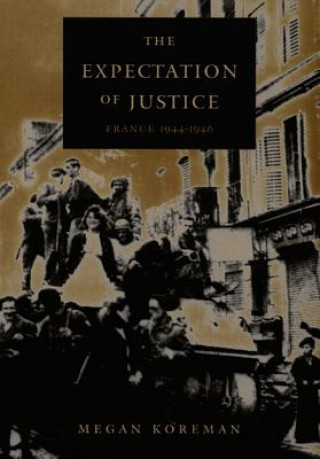
Kód: 04937133
Expectation of Justice
Autor Megan Koreman
In "The Expectation of Justice" Megan Koreman traces the experiences of three small French towns during the troubled months of the Provisional Government following the Liberation in 1944. Her descriptions of the towns' different w ... celý popis
- Jazyk:
 Angličtina
Angličtina - Väzba: Brožovaná
- Počet strán: 368
Nakladateľ: Duke University Press, 2000
- Viac informácií o knihe

Mohlo by sa vám tiež páčiť
-

Speaking Greek 2 Audio CD set
38.94 € -

Moral Essays
35.67 € -

Costume and Make-up
18.49 € -

High Impact Internal Evaluation
128.69 € -10 % -

Dictionary of Literary Biography
694.18 € -

Promising Practices for Elementary Teachers
52.43 € -

Poison's Dark Works in Renaissance England
157.82 €
Darčekový poukaz: Radosť zaručená
- Darujte poukaz v ľubovoľnej hodnote, a my sa postaráme o zvyšok.
- Poukaz sa vzťahuje na všetky produkty v našej ponuke.
- Elektronický poukaz si vytlačíte z e-mailu a môžete ho ihneď darovať.
- Platnosť poukazu je 12 mesiacov od dátumu vystavenia.
Viac informácií o knihe Expectation of Justice
Nákupom získate 102 bodov
 Anotácia knihy
Anotácia knihy
In "The Expectation of Justice" Megan Koreman traces the experiences of three small French towns during the troubled months of the Provisional Government following the Liberation in 1944. Her descriptions of the towns' different wartime and postwar experiences contribute to a fresh depiction of mid-century France and illustrate the failure of the postwar government to adequately serve the interests of justice. As the first social history of the "apres -Liberation" period from the perspective of ordinary people, Koreman's study reveals how citizens of these towns expected legal, social, and honorary justice - such as punishment for collaborators, fair food distribution, and formal commemoration of patriots, both living and dead. Although the French expected the Resistance's Provisional Government to act according to local understandings of justice, its policies often violated local sensibilities by instead pursuing national considerations. Koreman assesses both the citizens' eventual disillusionment and the social costs of the "Resistencialist myth" propagated by the de Gaulle government in an effort to hold together the fragmented postwar nation. She also suggests that the local demands for justice created by World War II were stifled by the Cold War, since many people in France feared that open opposition to the government would lead to a Communist takeover. This pattern of nationally instituted denial and suppression made it difficult for citizens to deal effectively with memories of wartime suffering and collaborationist betrayal. Now, with the end of the Cold War, says Koreman, memories of postwar injustices are resurfacing, and there is renewed interest in witnessing just and deserved closure.
 Parametre knihy
Parametre knihy
Zaradenie knihy Knihy po anglicky Humanities History Regional & national history
41.39 €
- Celý názov: Expectation of Justice
- Podnázov: France, 1944-1946
- Autor: Megan Koreman
- Jazyk:
 Angličtina
Angličtina - Väzba: Brožovaná
- Počet strán: 368
- EAN: 9780822323730
- ISBN: 0822323737
- ID: 04937133
- Nakladateľ: Duke University Press
- Hmotnosť: 636 g
- Rozmery: 231 × 158 × 28 mm
- Dátum vydania: 26. January 2000
Obľúbené z iného súdka
-

Hundred Years' War on Palestine
13.28 € -23 % -

Ethnic Cleansing of Palestine
12.87 € -24 % -

History of Japan
16.35 € -19 % -

Ten Myths About Israel
13.59 € -14 % -

Strange Death of Europe
15.22 € -21 % -

Decline and Fall of the Roman Empire
5.92 € -21 % -

Secret History
13.79 € -21 % -

God's Playground A History of Poland
68.68 € -

Mayflower
15.73 € -23 % -

How to be a Victorian
14.40 € -23 % -

Plantagenets
13.28 € -29 % -

General's Son
20.23 € -4 % -

Iran: A Very Short Introduction
11.54 € -19 % -

Temples of Karnak
153.53 € -

Twenty Years A-Growing
10.11 € -22 % -

Cuneiform
12.97 € -10 % -

History of Witchcraft in England from 1558 to 1718
19 € -

China in Africa
37.40 € -

Islandman
11.13 € -19 % -

Bohemian Paris
16.55 € -18 % -

Alexiad
17.78 € -20 % -

Lancaster And York
22.89 € -

Modern France: A Very Short Introduction
11.54 € -19 % -

Inside Hitler's Greece
21.05 € -20 % -

Diana: Her True Story - In Her Own Words
11.03 € -23 % -

The Fourth Turning
19.62 € -6 % -

The Oxford History of Ancient Egypt
17.98 € -19 % -

Churchill: The Power of Words
15.12 € -22 % -

Palestine
20.33 € -19 % -

Korean History in Maps
28 € -10 % -

Great Gatsby (Wisehouse Classics Edition)
16.14 € -37 % -

Viking Way
46.19 € -7 % -

The Thirteenth Tribe
12.56 € -

My Promised Land
18.49 € -

Vanished Kingdoms
18.80 € -22 % -

Age Of Revolution
16.55 € -23 % -

Life and Death of Anne Boleyn
22.99 € -

Coming of the Third Reich
18.70 € -23 % -

Children of Ash and Elm
18.70 € -23 % -

Europe Between the Oceans
34.23 € -7 % -

Socialism Betrayed
19.51 € -19 % -

303 Squadron
19.41 € -17 % -

Ancient Celts, Second Edition
26.77 € -19 % -

Dancing in the Glory of Monsters
15.83 € -22 % -

Battle of Britain: Luftwaffe Blitz (Images of War)
25.85 € -1 % -

Age of Confucian Rule
35.97 € -

Beyond Band of Brothers
16.55 € -23 % -

Benjamin Franklin
18.80 € -12 % -

On China
17.27 € -20 %
Osobný odber Bratislava a 2642 dalších
Copyright ©2008-24 najlacnejsie-knihy.sk Všetky práva vyhradenéSúkromieCookies



 21 miliónov titulov
21 miliónov titulov Vrátenie do mesiaca
Vrátenie do mesiaca 02/210 210 99 (8-15.30h)
02/210 210 99 (8-15.30h)